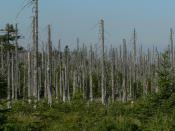As the century past, the industrial society kept advancing. However, many advantages of the industrial society brings us also has a down side. One of the adverse effects of industrialization is acid deposition due to power plant, fossil fuel and automobile emissions. Acid rain is the popular term but the scientists prefer the term acid deposition. Acid rain can have adverse effects on the environment by damaging forests or by lowering the pH of the lakes and making the water too acidic for many aquatic plants and animals to live.
The father of acid rain research is an Englishman named Charles Angus Smith who suggested in, 1852, that sulfuric acid in Manchester, English, was causing metal to rust and dyed goods to fade. One source that causes acid rain are fossil fuel. Fossil fuel has many usage in our society. Such as to power electric power plants, industrial boilers, smelters, businesses, schools, homes and vehicles of all sort.
These various energy sources contribute 23.1 million tons of sulfur dioxide and 20.5 million tons of nitrogen oxides to our atmosphere worldwide. When fossil fuels are ignited like oil and coal, they release carbon dioxide, a so-called greenhouse gas that traps heat within the earth's atmosphere which causes global warming that is taking place right now. Also, it releases sulfur dioxide, nitrogen oxide and various metals (mercury, aluminum) that are released into the atmosphere that reacts with other airborne chemicals (water vapor and sunlight) to produce sulfuric and nitric acid which later can be carried long distance from their source and be deposited as rain (acid rain) but acid doesn't just came from rain but also in the forms of snow, hail, fog, and mist.
Forests are a complex ecosystems that involves trees, soil, water, the air, climate and other living...


